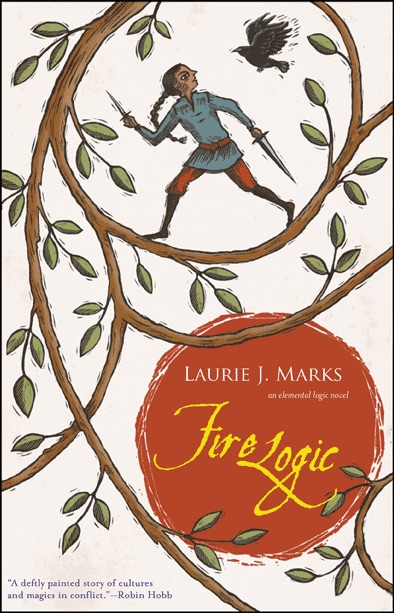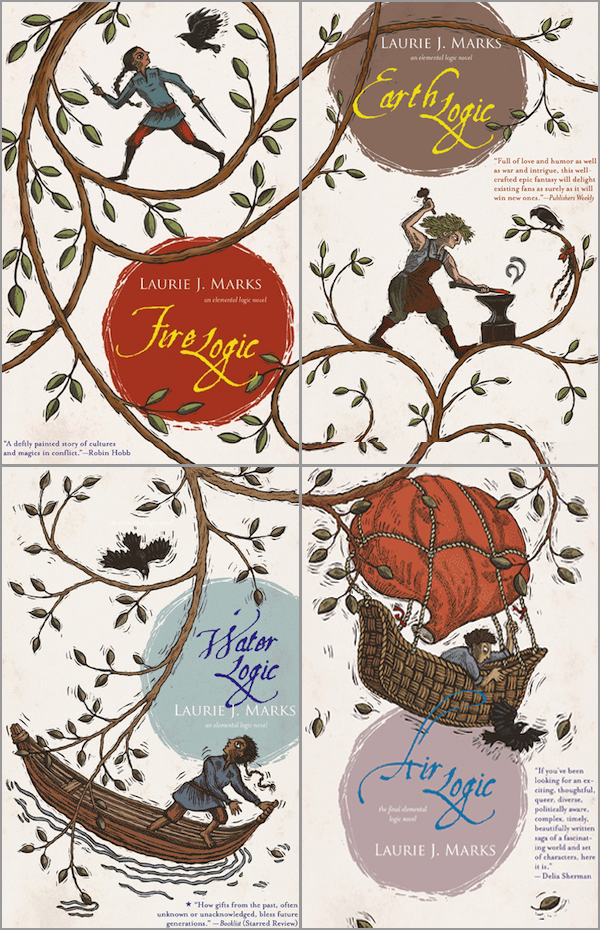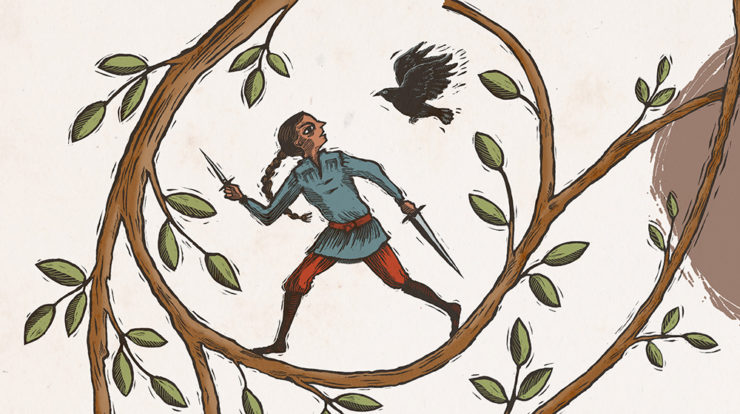Seventeen years after Tor’s original publication of the first Elemental Logic novel, Fire Logic, the fourth and final installment in the series is due out from Small Beer Press on June 4th. In the lead-up, the press has also released handsome reprint editions of the prior books, inviting a fresh base of readers to discover them—including me. Fire Logic was released in 2002 and won the Gaylactic Spectrum Award for Best Novel the following year. The sequel, Earth Logic, followed in 2003 and also won the same award. Water Logic, the third installment, signaled the publisher shift to Small Beer in 2007—but then nothing for almost twelve years.
As a result of that gap in publication, Laurie J. Marks’s series has lingered at the fringes of my awareness for a long while. I was barely twelve years old when Fire Logic came out, and seventeen when the third book was released; I hadn’t heard of them until I was twenty and delving more deeply into queer SFF awards lists and recommendations. Since then they’ve been on the “if I spot a used copy in the world, I’ll snag it” list but I hadn’t put special effort into seeking the books out as the series remained unfinished…until now. The release of the final novel presents the perfect incentive for finally diving into this continuing classic of queer fantastic literature. Furthermore, the series is as prescient now as ever in terms of its messages about community and resistance. Thus, I’ll be covering each of the novels here in turn, with a new essay appearing every Thursday for the next month.
The Elemental Logic books are political second-world fantasies that explore broad topics such as colonialism, the ethics of violence, and communalist versus individualist societies through the narrative lenses of various people who’ve come together to change the world (whether or not they know it, at first). Fire Logic opens with a government overthrown and its country taken under brutal occupation; the novel is about war and the law, resistance and survival. There are a lot of big concepts made real through small actions, particularly in terms of the strength of individuals banding together in unison to force change.
The three protagonists are Zanja, a diplomat whose people have been wiped out in an act of genocide; Emil, a soldier turned scholar turned soldier again (but still a scholar at heart); and Karis, a drug addict and metalworker whose connection to the land itself is far greater than one might suspect. Their paths interweave to create a small, dedicated kinship unit that exists, at the close of the novel, outside both the collapsing structure of Shaftali governance and the colonial oppression of the Sainnites. Instead of remaining within the shattered status quo, they—alongside a ragtag band of likeminded individuals, such as the half-Sainnite seer Medric—strike out to forge a third path.
As the first of four novels it sets the tone for the series, so that’s where I’d like to focus in this portion of our short essay series as well. Tone matters, and though with a text as richly complex as this there are a million things I’d talk about given all the time in the world, Marks’s overarching thematic argument still strikes an echoing chord at this precarious moment in global politics. As our diplomat protagonist Zanja explains to her soon-to-be partner Karis in an intimate conversation near the close of the book, “…to live is only worth the effort if you live in hope. And living in hope is a discipline, a practice that can be learned.”
Buy the Book


Fire Logic
The centering of hope as a practice, of hopeful thought as expansive and dangerous, is vital to the series’ political argument. Nurturing willful, wild, directed hope—even in moments of despair and defeat—is necessary to be able to envision a path out of conflict, in direct contravention of nihilism or the reactionary impulse. Kindness and generosity, as well as a willingness to learn, evolve, adapt: these are all part of the practice of hope, in contrast to revenge, dehumanization, and stagnation. Fire Logic struggles through a morass of trauma, both personal and communal, but comes out whole with an optimism not gutted by pain but tempered in it. It’s a powerful challenge to oft-fashionable grimness for pessimism’s sake, and two decades later, that’s still excessively relevant in literature as well as the world at large.
Terrible things happen to people in this novel, but the novel is not about terrible things happening to people. It’s about their whole-hearted survival.
As an example of how Marks’s ethos of constructive optimism structures the text, I’ll point toward the calm pleasure I felt in realizing that, for all the violence and abuse that occurs in Shaftal, gender and sexuality exist in a space of unremarkable equity. Homophobia and sexism are not considerations or powers with which to be reckoned. While rape exists and is acknowledged—as are murder, torture, political assassination, genocide—the potential for victimization is not directed with exploitive and lavish attention toward the punitive destruction of women’s bodies, or brown bodies, or queer bodies, or all of the above.
The couples (and moresomes) featured in romantic connections throughout the book are in fact predominantly and wonderfully queer: Karis and Zanja as well as Emil and Medric pair up, out of our protagonists. Norina is a woman in a relationship with a man, but Marks has cleverly illustrated the functions of gender in Shaftal’s social order therein as well. Norina is a Truthken, a lawgiver and sometimes-soldier, while her husband is a healer—and when she becomes pregnant, the irritation of carrying a child is explicitly noted as a thing she wishes he biologically was doing. He’s also the primary caregiver for the baby once the child is born. Their approaches to their roles are individual and specific rather than gendered in the “expected” manner.
It hearkens back, in my mind, to classic feminist, queer SF. Marks has built a world in the shape that Joanna Russ wrote about critically, that Le Guin imagined and so forth, where gender is not swap-reversed or rendered implausibly invisible. Rather, questions of production, labor, time, and privilege are constructed around the presumption of creating equity. There is a subtle brilliance to that considered and thoughtful approach to a world without patriarchal oppression. And it also means that sometimes, for instance, colonial brutality is meted out as much from a woman’s hands as a man’s, as much by soldiers as politicians as citizens.
But resistance, too, comes from all arenas. Instead of focusing on women’s bodies or on queerness as a site of punishment and oppression, Marks devotes the energies of worldbuilding toward exploring complex dynamics of occupation and guerilla resistance, population control and exploitation, and most importantly, the hard work of envisioning alternatives for a better future—then striving toward them. The different points of view our protagonists bring from their own cultures and traumas are what allow them to see around the blind corners that fifteen years of occupation have created, politically speaking. Marks refuses black-and-white constructions of ethics in her exploration of what it means to grow and evolve, as well. Medric, the young seer, is the reason Zanja’s people were eradicated, but Zanja then becomes the reason he’s able to escape the Sainnites after realizing his role in the brutality surrounding him.
Creating fresh paths is one of the results of the discipline of hope, in this novel. To be hopeful is to step outside the bounds of what has been to consider what might be. (Funnily enough, I’d say that’s also the function of speculative literature.) Being able to envision alternatives, to think big and broadly, to stretch the mind outside the usual range—all three protagonists are doing the work of forging a better path in this manner.
From the first, Zanja is a go-between who occupies liminal spaces. That is her role in her culture: a Speaker for the people who goes out in the world and comes back, forges connection, alliances, understands other ways of being. Emil has a wealth of experience and a constant, quiet curiosity that drives him to be willing to take risks, following his fire-elemental spirit to push for change. Karis has lived under the control of an addictive, often-fatal drug used to ensure her compliance since her childhood trafficking into slavery. As an adult she was placed in a power-fraught relation to her closest friend and keeper Norina, and yet she thrives through her single-minded focus on building communities around her. Compassion is her guidelight, but so is strength.
Marks’s solid, thorough, perceptive prose is the key to constructing a world so profoundly human, a world made of humans. Each of these three protagonists is unique and rich. Sometimes in concert and sometimes in conflict, their choices—and the choices that bind them—never fail to make sense emotionally. Big political fantasies often sacrifice the interior logics of their characters to focus on the chessboard of battles, coups, and so on. Marks does not make this mistake, at any point, as she understands to the core that revolutions are created out of individual people’s bodies, loves, and sacrifices.
Once more, with feeling: Fire Logic is a book about the discipline and practice of hope as opposed to the vague concept of it, a rejection of pessimism in support of productive resistance. The labor is hard and the path is long, uncertain, full of questions and failures and further trauma. However, with the support of a chosen band of collaborators, our protagonists close out the novel prepared to undertake the great work of their generation: forging a middle path between the collapsing sides of a cannibalistic, devastating struggle for power and revenge. In the parlance of the novels, the passion and intuitive drive of the fire bloods has been the predominant feature of the text—leaps of faith are made, sacrifices offered, loyalties earned and kept.
A collective has been created, and it is their shared hope that buoys them forward toward the grand stage of Shaftal’s possible futures. We’ll pick up with that story next week, with Earth Logic.
The Elemental Logic Books are available from Small Beer Press.

Lee Mandelo is a writer, critic, and editor whose primary fields of interest are speculative fiction and queer literature, especially when the two coincide. They have two books out, Beyond Binary: Genderqueer and Sexually Fluid Speculative Fiction and We Wuz Pushed: On Joanna Russ and Radical Truth-telling, and in the past have edited for publications like Strange Horizons Magazine. Other work has been featured in magazines such as Stone Telling, Clarkesworld, Apex, and Ideomancer.










